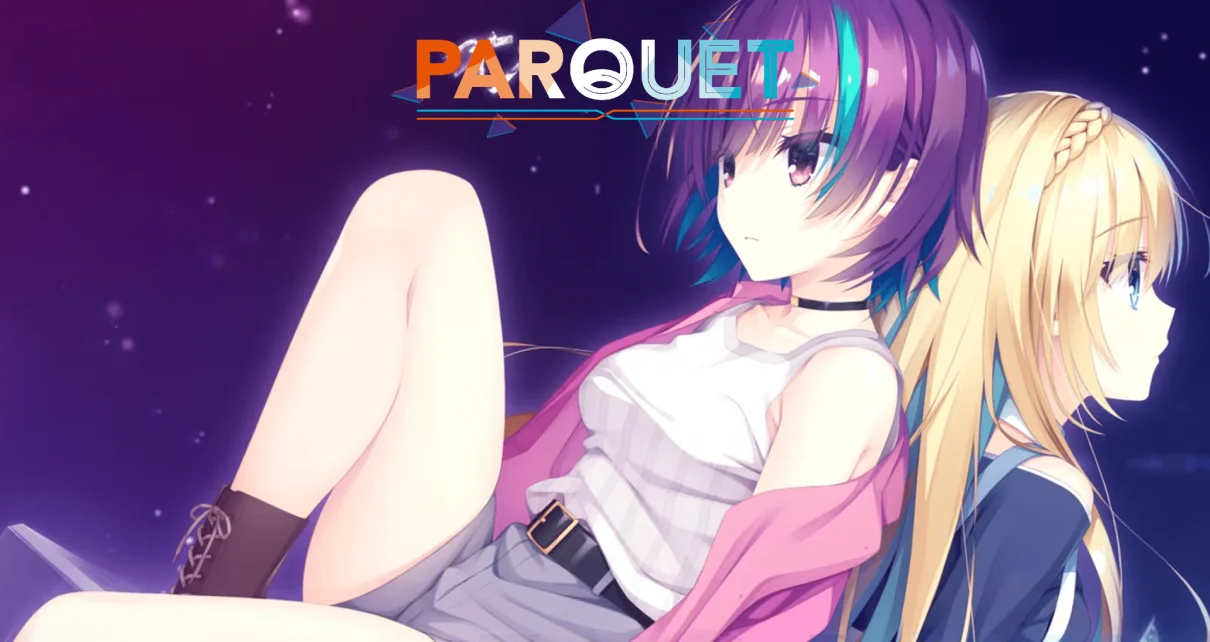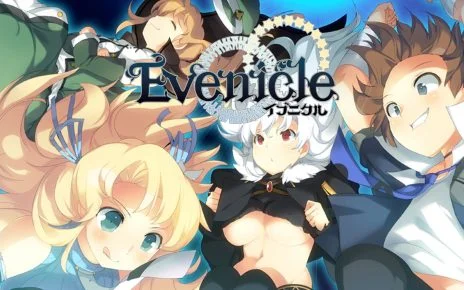Parquet is the debut visual novel from Yuzusoft Sour, a subsidiary of prominent visual novel studio Yuzusoft. Yuzusoft are known for producing romance visual novels with adult content, so Parquet, an all-ages visual novel that doesn’t focus on romance, is a departure from their usual releases. While I’m a fan of Yuzusoft’s past works, they do have a style, and I was interested to see how they might approach something different in Parquet. How would Yuzusoft Sour drive a nonromance story? Would Parquet feature a deeper dive into its intriguing transhumanist setting, or would this simply be a veneer for the usual slice of life tropes?
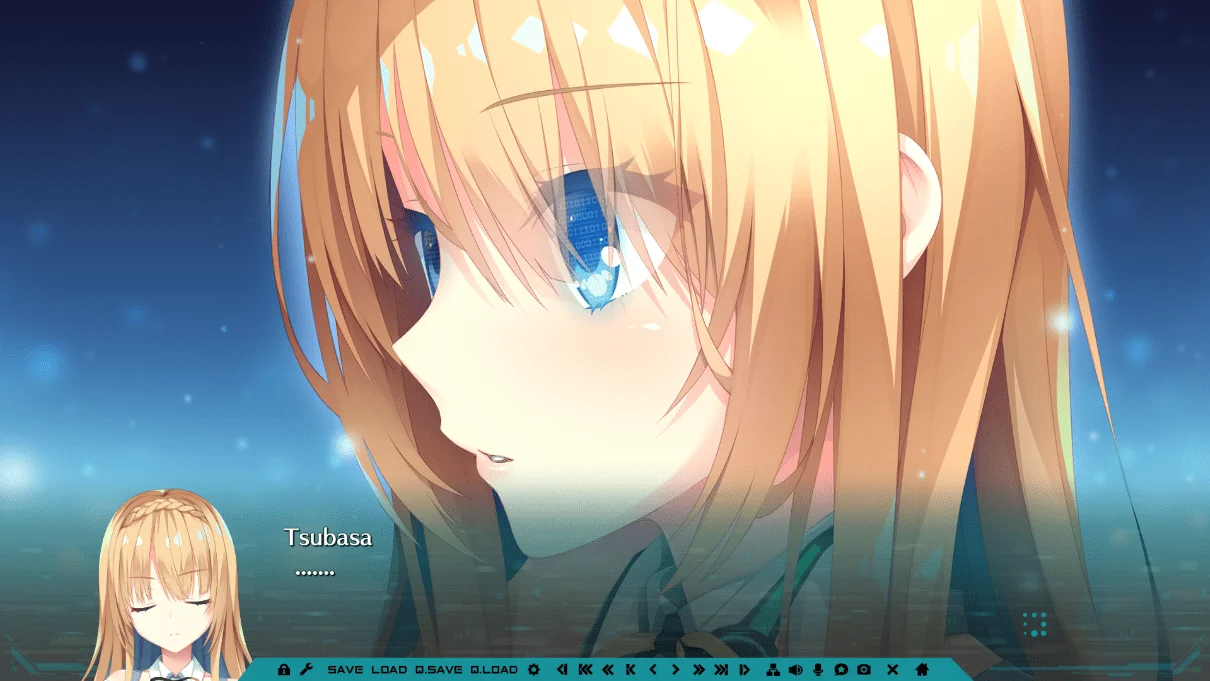
Welcome to the World of Tomorrow
Parquet takes place in a near-future where an invention called Brain-Machine Interface, or BMI for short, has revolutionized society. This technology allows individuals to upload and download memories directly from their brains. Need to learn something? Simply download all the information from a memory cube, no study needed. Want to know what it’s like to have a run-in with the law but don’t want to go to jail? Someone might be willing to let you experience their memory of such an event…for a price. While the main story connects with the technology and setting, Parquet doesn’t feature hardcore infodumps and worldbuilding. The sci-fi is more a vehicle to explore the themes of friendship and identity from a different perspective. Parquet’s world never sucked me in the way that of the similarly futuristic The Blind of the New World’s did, but it’s still a welcome change from the typical high school slice of life.
Against this backdrop, floundering robotics manufacturer Ibuki Corporation builds an artificial consciousness created from an amalgamation of memories to lead the company to glory. Equipped with all the knowledge to run a major corporation and no emotional baggage, this artificial being succeeds in returning Ibuki to prominence. But over time, he begins to wonder about his own existence and purpose. His job at Ibuki complete, he asks his handler for a name: Ibuki Kanato. Kanato then aspires, with few concrete aims or plans, to venture out into the world and learn what it means to be human.

Ghost in the Shell
Kanato might sound like an intriguing character with an interesting origin. Unfortunately, I found him a flat protagonist in practice. The problem with Kanato is twofold. For the first half of Parquet, he has no real goals. Rather, he passively lets things happen to him for the sake of “experiencing” and responds to everything in milquetoast fashion, nodding and offering noncommittal agreement or quickly folding and apologizing at the slightest of provocations. Perhaps this makes sense given his lack of life experience and desire to observe and learn. He could be an introspective protagonist like Tsushima Kei of Musicus! However, we rarely see insightful reflection in his inner monologue either. The result is that much of Parquet feels like Kanato aimlessly stumbling through the mundane events of daily life with no purpose or development.
I think Kanato not being voiced contributes to his lack of impact too. Straightforward dialogue can be imbued with greater meaning through inflection and pacing. However, Parquet neither gives Kanato a voice nor adds much descriptive text to add flavor or context to his lines. As a result, it’s hard not to experience them as wooden and lifeless. He also has very little chemistry with the other characters. He plays off every joke as the straight man, and while thoughtful and kind, is always direct. Kanato never has that spark or natural vibe with anyone.
In the second half of Parquet, Kanato gains more concrete objectives. This allows him to find a voice, express himself, and take initiative. While his development was welcome and much improved him as a character, I still couldn’t shake the wooden feeling. Maybe it’s that his dialogue never stops being earnest and matter of fact without a voice or description to elevate it. Or maybe by the time he got any real development his first impression had stuck too hard.
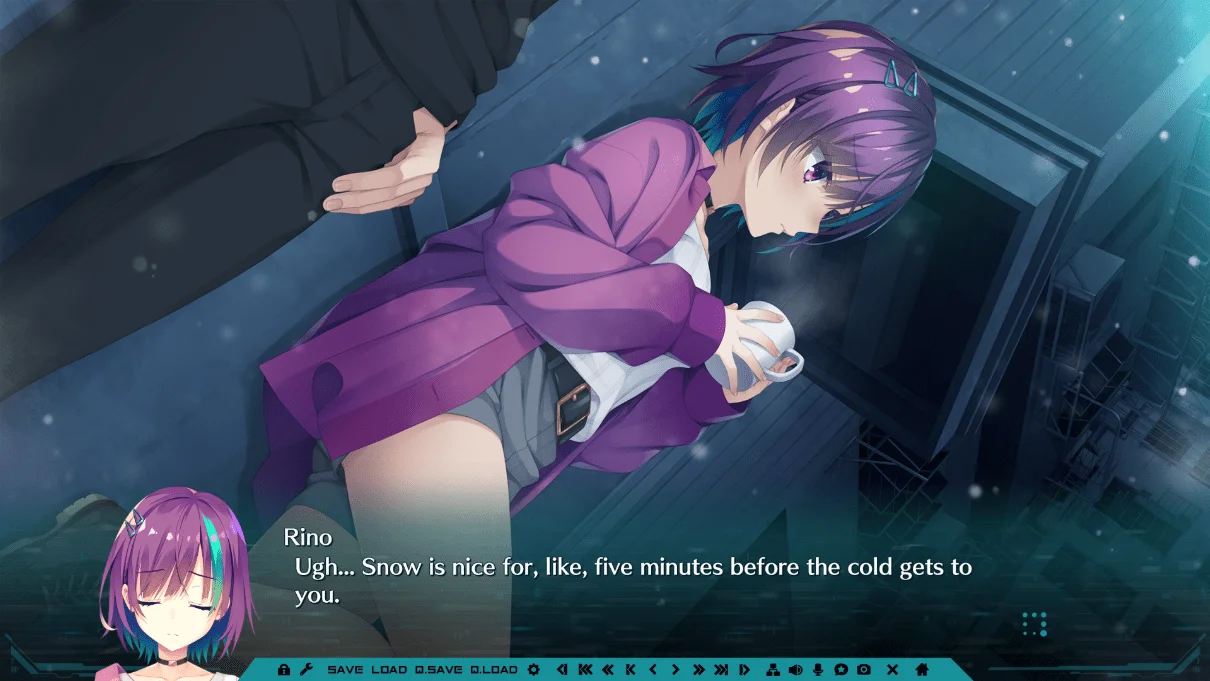
The Sun and the Stars
Fortunately, the rest of the cast has charisma to spare. The main heroines in particular strike a good balance between fun tropes that make their first impressions memorable and depth that reveals itself as Kanato gets to know them. The nocturnal Ibaraki Rino is cold and sardonic at first. Of course she does first meet Kanato while he’s wasted in a back alley, so not the most auspicious of starts. She’s actually very kind though. She helps him on that first night and takes her work as a florist seriously. And though she’s often a woman of few words, Rino is thoughtful and expressive when she does decide to open up.
In contrast, Kido Tsubasa is bright and cheerful. She loves nothing more than spending her days eating good food and telling off-color jokes. She easily gets along with others and enjoys her job as a café waitress. However, as her dark humor hints, there’s a great weight behind that smile—a weight of uncertainty and responsibility. As Kanato gets to know her, might he see past the mask?
The side characters are good fun without stealing the spotlight. Tsubasa’s friend Nika has a mischievous energy, while her father, a lovable grump maybe a little too obsessed with his daughter, and Rino’s motherly boss Aya provide some playful silliness. Overall Parquet doesn’t have a lot of humor, and it’s usually the side characters who keep things lighthearted. The story is earnest, so a straighter approach works. And it’s nice to play something free from the low-effort sex jokes that are so ubiquitous in romantic comedy visual novels.
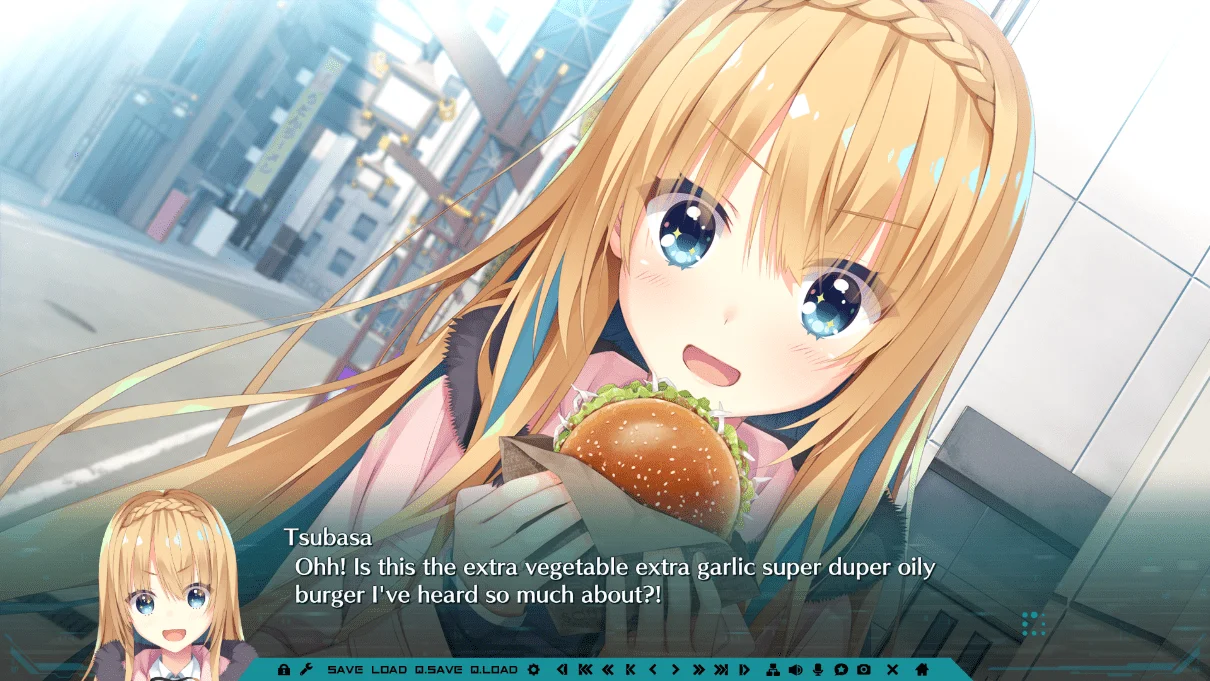
If I Could Reach You…
The first half of Parquet is mostly slice of life. While I enjoyed getting to know the heroines, it can also feel slow and aimless at times, usually due to Kanato’s lack of direction and initiative. Things start to pick up in the second half once the heroines open up to Kanato. Understanding the nature of their connection and pasts build stakes as the story explores its themes of friendship and identity. Who do you want to be? Who do you have a right to be? What makes life worth living? Rino and Tsubasa don’t have the easiest of lives, and they’ll have to face some difficult truths to find their answers.
Because Parquet isn’t a romance, the relationship between Rino and Tsubasa is just as important as their relationships with Kanato. Honestly, I thought this was the best part of Parquet. The way the two are simultaneously always close at hand yet a world apart and fight against their limitations and weaknesses to bare their hearts to each other is moving. The relationship is thoughtfully written, with surprising revelations and mature nuance. Kanato is something of a conduit connecting the two. I never felt his role was quite as interesting, but he does grow into a valued member of the trio.
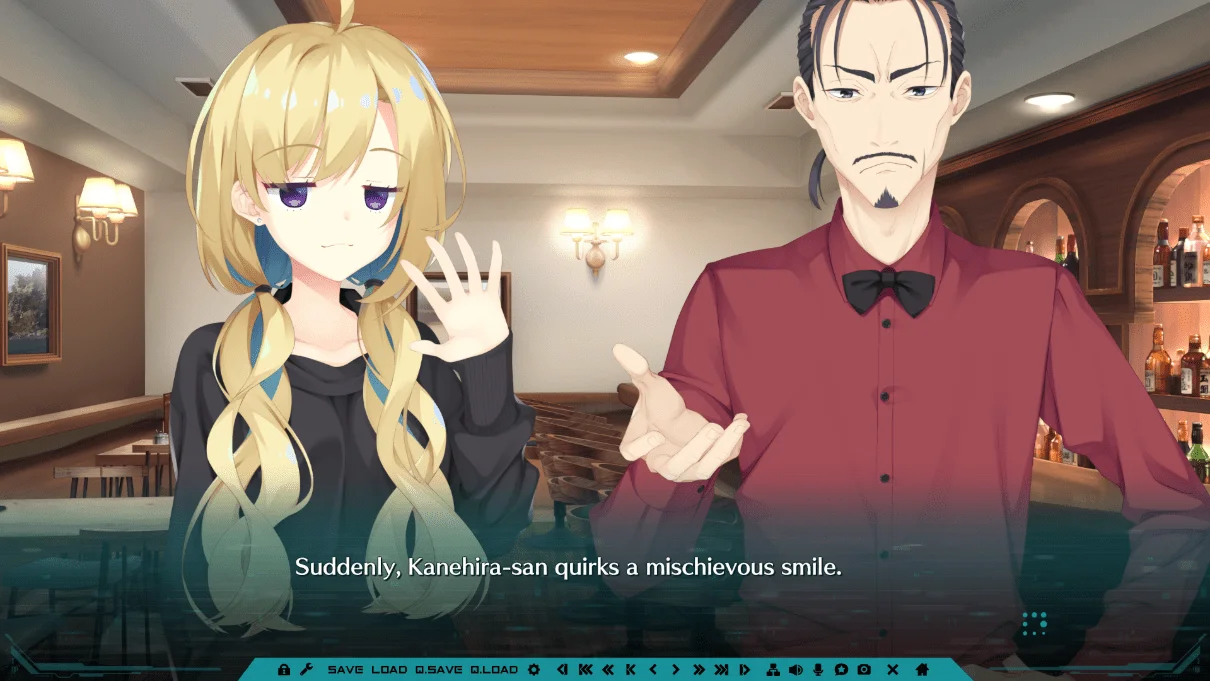
Art, Sound, and Extras
Yuzusoft’s releases have some of the highest production values in the industry, and Parquet is no exception. The menus and interface are stylish with a number of touches fitting the setting. The text box has a background of data streams and fade-outs are accompanied by a pixelation effect. The color palette is heavy on blues, but if you watch sci-fi that’s par for the course. The future is always blue.
The art looks great and follows the usual Yuzusoft aesthetic. Both the backgrounds and sprites are highly detailed. Small touches like the light reflecting from the characters’ eyes and unique eyelashes for each character reveal exquisite craftsmanship. Sprites constantly change expressions while they speak to match the lines and voicing, and occasional super-deformed CGs inject a little extra verve into the liveliest scenes. My one minor complaint is that one character’s hand is fixed in a permanent wave, and it looks a little unnatural. But overall, the art does an excellent job breathing life into the characters.
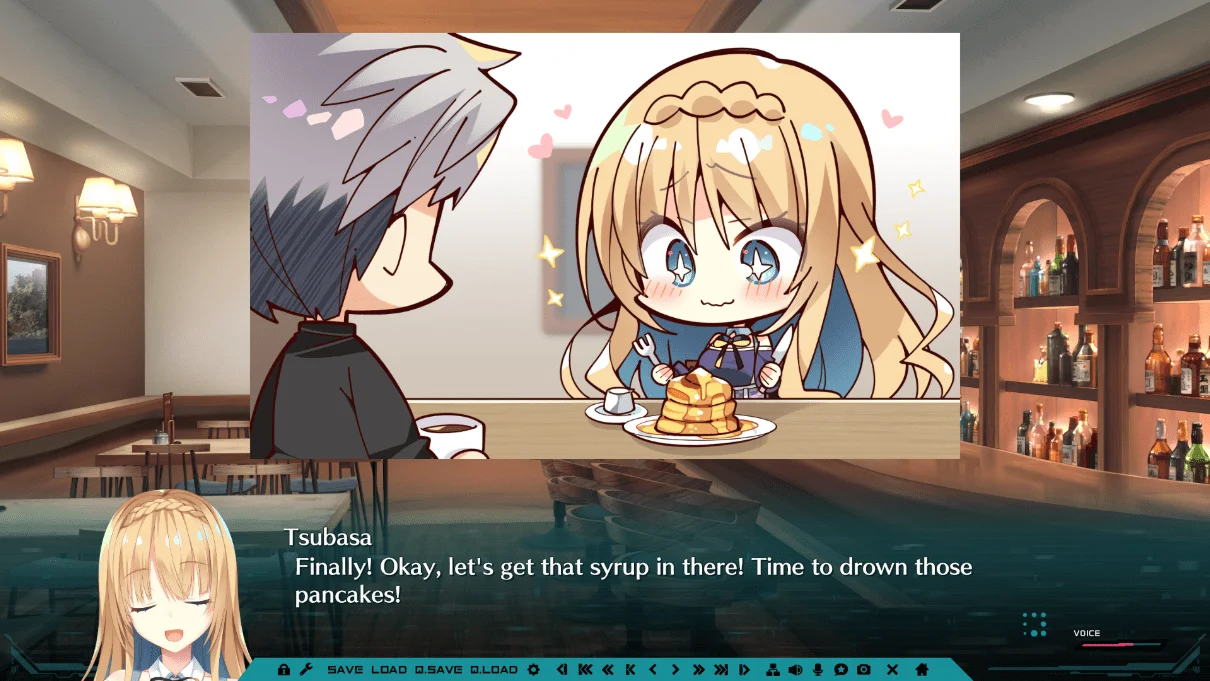
The voice acting is equally excellent. Lead VA Touyama Nao has some impressive anime credits to her name, and she delivers here as well. Both heroines sound distinct and deftly navigate a range of emotions. I liked her performance of Rino in particular. It’s not easy to deliver so many deadpan lines yet also convey that there’s something behind them, but she nails it. As far as voicing, Rino quickly became one of my favorite quiet heroines. Touyama Nao may be the star, but the rest of the cast are no slouches. I enjoyed all the voices, even those of more minor side characters like the curmudgeonly detective Aku.
Parquet is a kinetic novel; there are no choices or branching in the main story. However, Yuzusoft’s flowchart, my favorite convenience feature, still makes an appearance. It neatly divides the approximately 8-hour experience into chapters and scenes, and you can easily jump anywhere with a single click. There is also a brief epilogue for each of the heroines that provide a dash of romance if that’s something you missed. The stories are cute, but I couldn’t see Kanato as a romantic lead. His lack of chemistry with either of the heroines undercut the romantic development. And since the epilogues are only about 15 minutes apiece, there’s not enough time to evolve his relationships in a convincing manner. Beyond these, you get the usual suite of extras—CGs, music, cinematics—all served up in a sleek menu.

Verdict
Parquet unfortunately suffers from a weak protagonist and a sometimes slow story that doesn’t delve as deeply into its transhumanist setting as you might hope. That said, it hits on almost everything else. Well-developed heroines, fun side characters, and meaningful friendship evoke warm feelings, while top-notch production values make the experience a feast for the senses. Parquet is a departure from the usual Yuzusoft romance and might not be their greatest work. Still, I think it’s worth experiencing on its own terms: as a heartwarming story about friendship and finding one’s purpose whose setting offers a welcome change from the usual slice of life experience.
PARQUET IS RECOMMENDED

Enjoy visual novels? How about checking out our review of Kinkoi: Golden Loveriche or Sugar * Style?
Many thanks go to NekoNyan for a PC review code for this title.
A veteran of Oregon Trail and Battletoads, Wes has been playing and talking about games for as long as he can remember. He’s down to try almost anything, and he especially enjoys games with gripping narrative experiences.

